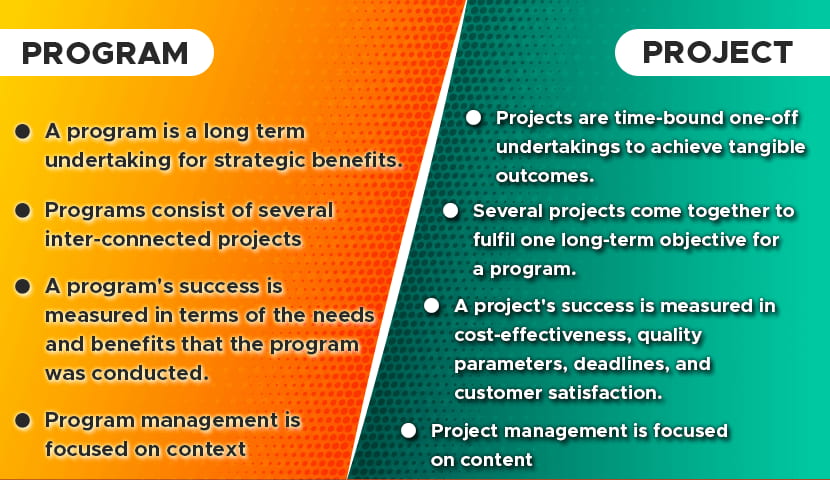Project vs programme management – In the realm of project management, understanding the distinction between projects and programmes is paramount. This discourse will delve into the intricate differences between these two concepts, exploring their scope, objectives, timelines, stakeholders, and risk management strategies. By unraveling these nuances, we gain invaluable insights into effective project and programme management.
Projects, characterized by their finite scope and specific deliverables, stand in contrast to programmes, which encompass a broader range of interconnected projects aimed at achieving strategic objectives. These variations have a profound impact on management approaches, resource allocation, and communication strategies.
Project vs Programme Management Definitions

Project management and programme management are distinct disciplines that share similarities but have key differences. A project is a temporary endeavor undertaken to create a unique product, service, or result. It has a defined start and end date, and a specific scope and budget.
A programme, on the other hand, is a group of related projects that are managed together to achieve a larger goal. Programmes are typically more complex and longer-term than projects, and they often involve multiple stakeholders and organizations.
Here are some examples of projects and programmes:
- Projects:Building a new bridge, launching a new product, or implementing a new software system.
- Programmes:Developing a new transportation system, improving healthcare outcomes in a region, or reducing poverty in a developing country.
Scope and Objectives
The scope of a project is the work that needs to be completed to achieve the project’s objectives. The objectives of a project are the specific outcomes that the project is intended to achieve. The scope of a programme is broader than the scope of a project, and it includes all of the projects that are part of the programme.
The objectives of a programme are also broader than the objectives of a project, and they represent the overall goal that the programme is intended to achieve.
The scope and objectives of a project or programme have a significant impact on the management strategies that are used. For example, a project with a small scope and simple objectives can be managed using a relatively simple management approach.
However, a programme with a large scope and complex objectives will require a more sophisticated management approach.
Timelines and Resources, Project vs programme management
The timelines and resources for a project or programme are closely related to the scope and objectives. A project with a small scope and simple objectives will typically have a shorter timeline and require fewer resources than a programme with a large scope and complex objectives.
The timelines and resources for a project or programme can also be influenced by external factors, such as the availability of funding or the availability of skilled workers. For example, a project that is funded by a government grant may have a shorter timeline than a project that is funded by private investors.
Stakeholders and Communication
The stakeholders in a project or programme are the individuals or groups who have an interest in the project or programme. Stakeholders can include customers, employees, suppliers, partners, and the community. It is important to identify all of the stakeholders in a project or programme and to develop a communication strategy that meets their needs.
The communication strategies for projects and programmes can vary depending on the size and complexity of the project or programme. For example, a small project with a few stakeholders may only require a simple communication plan. However, a large programme with multiple stakeholders may require a more sophisticated communication plan that includes a variety of communication channels.
Risk Management
Risk management is the process of identifying, assessing, and mitigating risks. Risks are events that could potentially harm a project or programme. It is important to identify all of the risks that could affect a project or programme and to develop a risk management plan that mitigates these risks.
The risk management strategies for projects and programmes can vary depending on the size and complexity of the project or programme. For example, a small project with a few risks may only require a simple risk management plan. However, a large programme with multiple risks may require a more sophisticated risk management plan that includes a variety of risk management techniques.
Last Recap
In conclusion, project and programme management represent distinct approaches tailored to different organizational needs. Projects excel in delivering specific outcomes within a defined timeframe, while programmes orchestrate complex initiatives that drive long-term strategic goals. Understanding the interplay between these two concepts empowers organizations to optimize their management practices, enhance stakeholder engagement, and achieve exceptional results.
Detailed FAQs
What is the key difference between a project and a programme?
Projects are discrete endeavors with specific objectives and deliverables, while programmes are broader initiatives that encompass multiple projects and aim to achieve strategic goals.
How does scope impact project management?
The distinction between project and programme management is crucial for understanding the complexities of managing large-scale initiatives. In the context of property management, for instance, projects such as building renovations or tenant acquisition campaigns have specific goals and timelines, while programmes like property management in Madison encompass ongoing operations and strategic planning that span multiple projects.
By recognizing this distinction, property managers can effectively align their efforts with organizational objectives and deliver successful outcomes.
Scope defines the boundaries of a project and influences the resources, timeline, and management strategies required to achieve its objectives.
What are the common challenges in stakeholder communication for programmes?
Programmes involve numerous stakeholders with diverse interests. Coordinating communication and managing expectations can be complex, requiring effective stakeholder engagement strategies.
